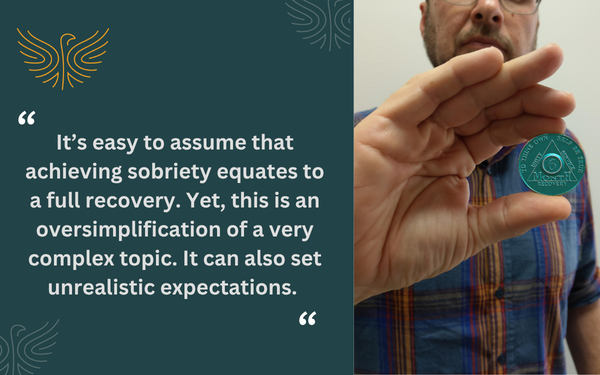Sobriety and recovery are often used interchangeably. But knowing the difference can help guide you and lay the foundation for your goals and expectations. So, what is the difference exactly? Are they similar in any way?
Is Sobriety and Recovery the Same Thing?
In short, no. However, they are related.
It’s easy to assume that achieving sobriety equates to a full recovery. Yet, this is an oversimplification of a very complex topic. It can also set unrealistic expectations. When someone stops using substances, their journey isn’t complete. It doesn’t necessarily mean they won’t face hurdles, triggers, or temptations. It also definitely doesn’t mean that relapse can’t happen (in fact, relapse is quite common in recovery).

While both represent significant achievements, recovery vs sobriety serve different purposes in the healing process. Sobriety creates the foundation, while recovery builds the structure for lasting change. So, let’s take a closer look.
What is Sobriety?
Sobriety refers to the state of abstaining from alcohol, drugs, or other addictive substances. It marks the initial first steps toward healing. It also signifies a release from the physical hold that such substances may have had on an individual, which, in itself, is a major milestone.
Sobriety can be measured in concrete terms—such as days, weeks, months, or years without using. Many individuals achieve sobriety through detoxification programs, which often involve round-the-clock medical supervision and support. In turn, this creates the foundation for real and lasting change to take place.
At the same time, sobriety doesn’t address the emotional and psychological aspects of addiction. In other words, it’s possible to achieve sobriety and still struggle with underlying mental health issues or unhealthy coping mechanisms.
What is Recovery?
Recovery, on the other hand, is an ongoing process. It involves improvements in mental, physical, emotional, and even spiritual well-being. Usually, recovery includes counseling and other therapeutic interventions to develop healthy coping strategies, rebuild relationships, and address underlying issues that may be contributing to one’s addiction.
Unlike sobriety, where there is a measurable timeline, recovery is different for every individual. It also often requires active participation in therapy, support groups, and other treatments. Overall, it’s usually viewed as a path toward personal growth and wellness. There’s no fixed end date, which is why it’s often referred to as a journey rather than a destination.
_______________________________________________________
What Does Success Look Like in Recovery?
Ultimately, success in recovery goes beyond counting days, months, or years (which is what sobriety focuses on). And it’s worth noting that success may look different for everyone.
It may mean rebuilding trust and closeness in relationships with loved ones. It often includes building greater resilience, especially in the face of life’s inevitable challenges. It also frequently involves improved physical and mental health, where the individual has developed healthy habits that support their overall wellness.
In many cases, goals become more attainable. Many people who find success in recovery also notice a shift in mindset toward growth and contribution. They may return to school, advance their careers, or explore creative interests—pursuits that were often absent during the period when they were using substances. Some individuals also find purpose in helping others who are struggling with substance use.
At the end of the day, recovery is a very personal journey. It’s also rarely straightforward, meaning setbacks and relapses happen. But every time this occurs, recovery is about re-committing and making adjustments or changes as needed. When a setback happens, it’s not viewed as a failure but as an opportunity to learn and grow.
It’s also worth noting that success in recovery is gradual and often arises through small, subtle shifts. For instance, learning to communicate feelings instead of numbing them, choosing healthy activities over isolation, or reaching out for support during difficult times all constitute meaningful progress.
Recovery success ultimately means reclaiming agency over one’s life, developing authentic relationships, and finding sustainable ways to experience joy and fulfillment. The journey requires patience, self-compassion, and an understanding that healing occurs gradually through consistent effort rather than dramatic transformations.
_______________________________________________________
How Freedom Recovery Centers Support Both Sobriety and Recovery
At Freedom Recovery Centers (FRC), we recognize that achieving lasting wellness requires addressing both the immediate need for sobriety and the long-term journey of recovery.
Thus, our comprehensive approach begins with medically supervised detoxification, ensuring you safely navigate withdrawal while receiving round-the-clock medical monitoring and support. After this initial detoxification stage, you’ll enter recovery care, which helps address underlying trauma, mental health, and personal triggers through individual counseling.
Group therapy and peer support also help foster connection, accountability, and reduce isolation. Family therapy may also help rebuild relationships and strengthen support systems. Meanwhile, life skills training prepares you for real-world challenges, while aftercare planning ensures ongoing support beyond treatment.
No matter where you’re at in your journey, our caring and compassionate team is here to support you. When you’re ready, call us at 804-635-3746 or fill out our online form. Your journey toward a happier and healthier life begins with a single step.
.svg)






.svg)

.svg)



.svg)
